CNC machining services forUSA
Place your request for advanced components
Our CNC machining services, in USA , makes precision parts for your demand.

Welcome to DongGuan ChengYang, a premier CNC machining service provider catering to the needs of clients in Connecticut. With our state-of-the-art equipment and highly skilled team, we are dedicated to delivering top-quality CNC machining services that not only meet but exceed the expectations of our customers. Whether you are looking for precision machining, rapid prototyping, or custom part manufacturing, we have the expertise and resources to fulfill your requirements with precision and efficiency.
Our commitment to excellence and customer satisfaction sets us apart as a trusted partner for all your CNC machining needs in Connecticut. From small-scale projects to large-scale production runs, we have the capabilities to handle various specifications and deliver exceptional results. With a focus on quality, reliability, and timely delivery, we ensure that every project is completed to the highest standards to help our clients achieve their goals and succeed in their respective industries. Experience the difference of working with a reliable and experienced CNC machining service provider like DongGuan ChengYang.
CNC Machining services
Dongguan C.Y. utilizes a full suite of CNC milling equipment—including 3-axis, 4-axis, and 5-axis CNC milling machines, enables us to proficiently processing part ranging from basic to advanced.
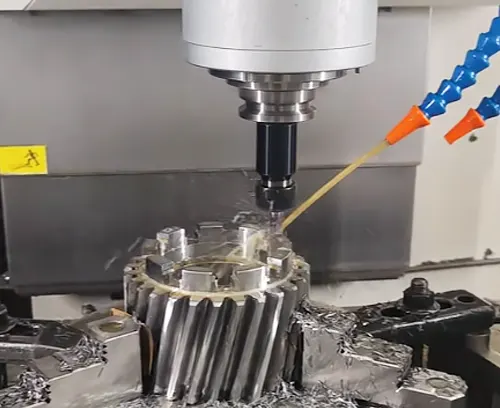
CNC Milling
Our shop features CNC milling capabilities, ensuring top-quality components are delivered with speed and accuracy.
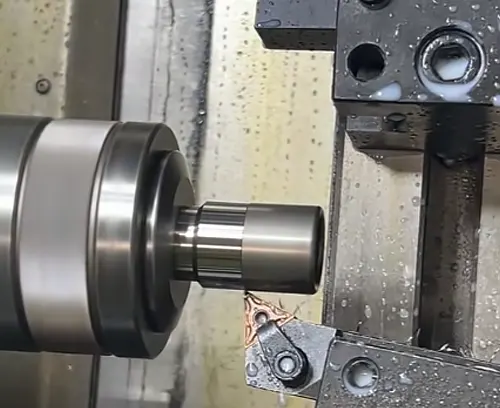
CNC Turnning
Our CNC lathes, turning centers, and mill-turn equipment enable us withefficiency to fabricate a broad range of parts for every patron.
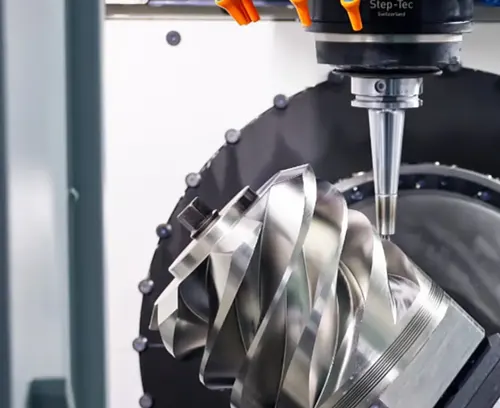
5 Axis CNC Milling
Equip with 5-axis machining technology for complex and finely calibrated components. Featuring faster production, it's perfect for intricate designs.
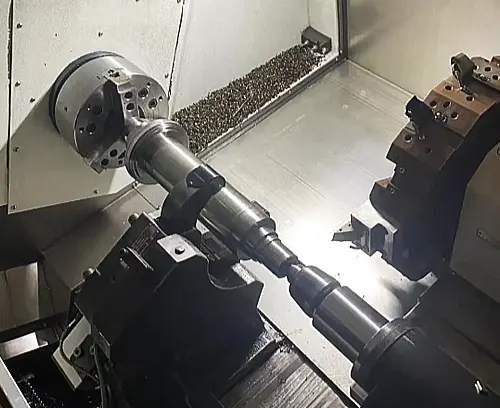
Precision Machining
Execute top-tier machining services by aligning different manufacturing stages to optimize output, reliability, and quicken production cycles, guaranteeing reliable, high-quality output.
Capabilities
Maximum Dimensions
2000mm x 1500mm x 800mm or 78.7 x 59 x 31.5 inches.
Maximum Dimensions
2000mm x 1500mm x 800mm or 78.7 x 59 x 31.5 inches.
Support Threading
Prefer Metric Threads, Also Support UNC and UNF threads.
Wall Thickness
Generally, a workable minimum wall thickness is 0.5mm for metals and 1.0mm for plastics.
Material Available
Metals: Aluminum, Copper, Brass, Bronze, Stainless Steel, Carbon Steel, Steel Alloy, Titanium, and plastic, etc .
Tolerances
Dimension: Depends on the size and material, generally +/- 0.01mm or 0.0004 inches
Common CNC DFM
DFM reduces production barriers by fine-tuning designs before they reach the factory floor.

Sharp Corner

Undercut

Undercut

Thick Walls

Tolerance Guide

Small Hole

Narrow Area
Metal Materials
We offer instant quotes for over 100 metals and help compare processing material costs.Get fast, reliable quotes for 100+ metals while exploring processing cost options.
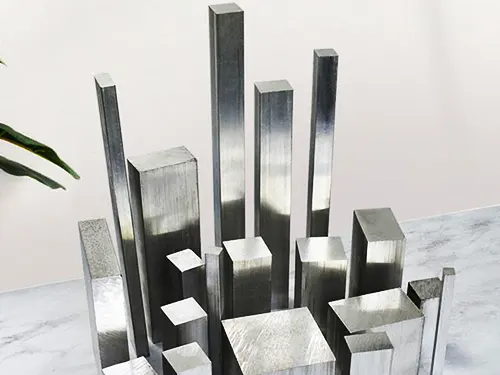
Aluminum
Aluminum is a popular material used in CNC machining due to its lightweight nature, high strength-to-weight ratio, and excellent corrosion resistance. This makes it ideal for a wide range of applications, from aerospace components to consumer electronics. Some common types of aluminum materials used in CNC machining include 6061 aluminum, which is known for its higher strength and weldability, as well as 7075 aluminum, which is prized for its high strength and hardness. Other popular options include 2024 aluminum, which offers good machinability and fatigue resistance, and 5083 aluminum, which is commonly used in marine applications for its corrosion resistance. Each type of aluminum material has unique properties that make them suitable for different machining requirements.
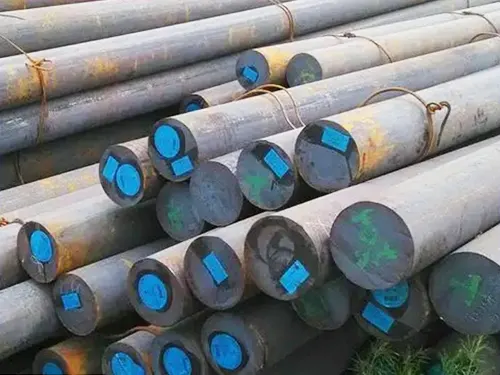
Carbon Steel
Carbon steel is a popular material used in CNC machining due to its high strength and durability. It is an alloy that contains varying amounts of carbon, which gives it its characteristic hardness. Some common types of carbon steel used in CNC machining include AISI 1018, AISI 1020, and AISI 1045. AISI 1018 is known for its excellent weldability and machinability, making it a versatile choice for a wide range of applications. AISI 1020 is another widely used carbon steel with good machinability and moderate strength. AISI 1045 is a medium carbon steel that is highly popular for its toughness and wear resistance, making it suitable for applications requiring high strength and durability.
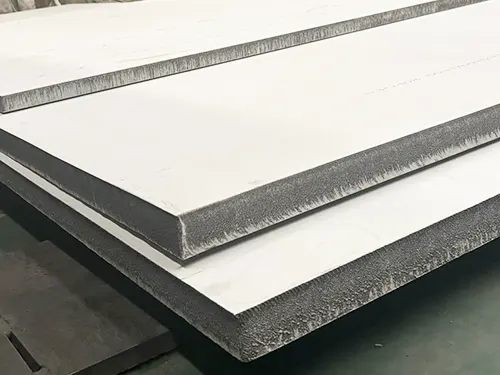
Stainless Steel
Stainless steel is a commonly used material in CNC machining due to its durability, resistance to corrosion, and overall versatility. It is a type of steel alloy that contains at least 10.5% chromium, which creates a protective layer on the surface of the metal, making it highly resistant to rust and staining. Some common types of stainless steel used in CNC machining include 304, 316, and 17-4 PH. 304 stainless steel is known for its excellent formability and weldability, making it suitable for a wide range of applications. 316 stainless steel is often used in environments with high levels of corrosion, such as marine and chemical processing. 17-4 PH stainless steel is heat treatable and offers high strength and hardness.
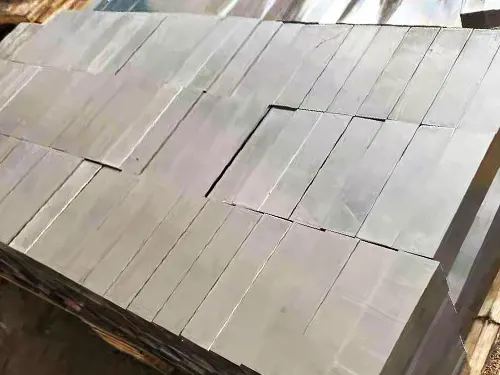
Tool Steel
Tool steel is a type of material commonly used in CNC machining due to its high strength, toughness, and wear resistance. It is specifically designed to withstand the high temperatures and forces generated during the cutting and shaping processes. Some common types of tool steel for CNC machining include A2 tool steel, D2 tool steel, M2 tool steel, O1 tool steel, and S7 tool steel. A2 tool steel is known for its high wear resistance and edge retention, making it suitable for cutting tools. D2 tool steel is favored for its high hardness and resistance to deformation. M2 tool steel is recognized for its high speed and efficiency in machining operations. O1 tool steel is widely used for forming applications, while S7 tool steel is known for its impact resistance and toughness.
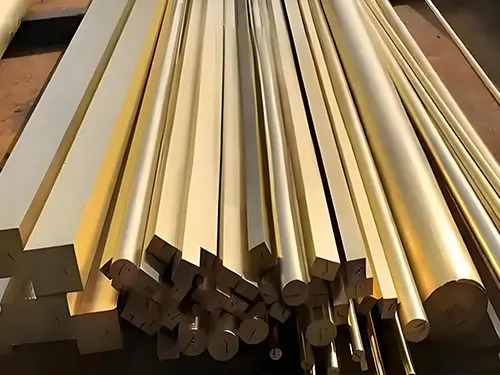
Brass
Brass is a popular material used in CNC machining due to its excellent machinability, corrosion resistance, and attractive golden appearance. It is a metal alloy primarily composed of copper and zinc, with small amounts of other elements such as lead or tin added to enhance its properties. Common types of brass used in CNC machining include C260 (cartridge brass), C360 (free-cutting brass), C464 (naval brass), and C485 (leaded brass). Each type of brass has specific characteristics that make it suitable for different applications. Cartridge brass is often used for fittings and connectors, while naval brass is preferred for marine applications due to its high corrosion resistance. Leaded brass, on the other hand, is valued for its improved machinability. Overall, brass is a versatile material that offers a balance of strength, machinability, and aesthetics for CNC machining projects.
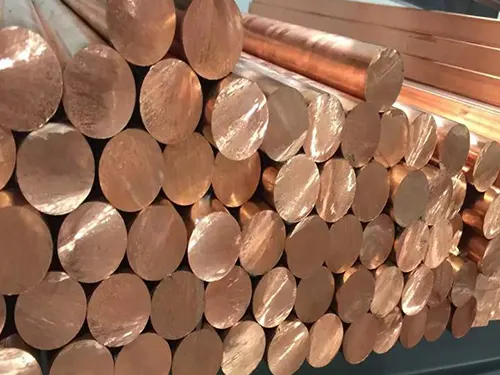
Copper
A collet or collet chuck, commonly referred to as a “Cooper” in CNC machining, is a tool holder that securely grips and centers a cutting tool or workpiece for machining. Common materials used to make collets include steel, carbide, and brass. Steel collets are durable and able to withstand high temperatures, making them ideal for heavy-duty machining applications. Carbide collets offer superior hardness and wear resistance, making them suitable for precision machining of tough materials. Brass collets are softer and gentler on delicate workpieces, making them a popular choice for light-duty machining tasks. Each type of collet has its own unique characteristics and is selected based on the specific requirements of the machining operation.
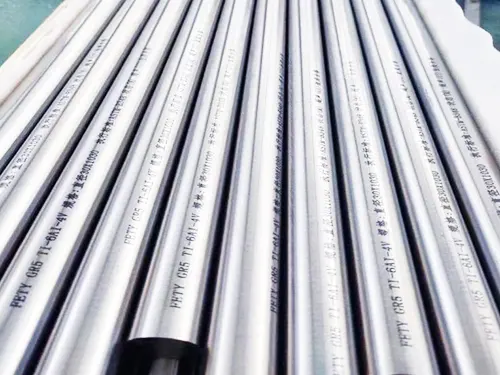
Titanium
Titanium is a popular material used in CNC machining due to its exceptional strength, light weight, and corrosion resistance. It is commonly chosen for aerospace, medical, and automotive applications. Some common types of materials used in CNC machining alongside titanium include aluminum, stainless steel, brass, copper, and plastics like ABS and acrylic. Each material has its unique properties and benefits, making them suitable for a wide range of manufacturing needs. When selecting the right material for CNC machining, it is important to consider factors such as durability, cost, finish quality, and compatibility with the specific project requirements.
Plastic Materials
We offer instant quotes for over 200 plastics and help compare processing material costs.
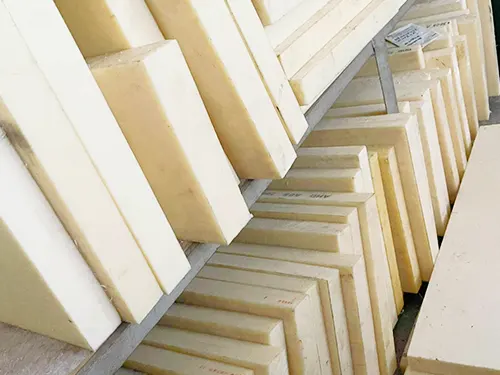
ABS
ABS, or Acrylonitrile Butadiene Styrene, is a common thermoplastic polymer used in CNC machining processes. One of the main advantages of ABS is its high impact resistance and strength, making it ideal for functional prototypes and end-use parts. Additionally, ABS is known for its excellent dimensional stability and resistance to heat, chemicals, and solvents. However, ABS can be challenging to machine due to its tendency to warp and shrink during the cooling process, which can lead to inaccuracies in the final part. Furthermore, ABS has a lower temperature resistance compared to other materials like PEEK or nylon, limiting its use in applications where high heat resistance is required. Overall, while ABS offers a balance of properties suitable for many CNC machining applications, its limitations should be carefully considered before selecting it as a material for a project.
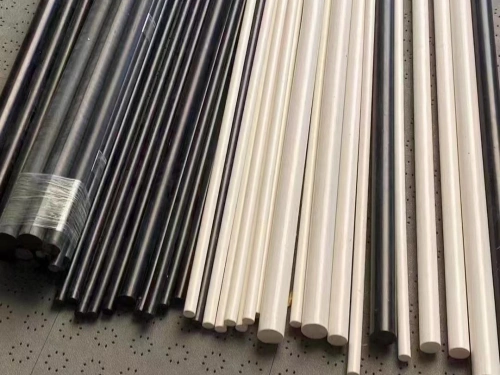
PMMA
PMMA, which stands for polymethyl methacrylate, is a commonly used material in CNC machining due to its versatility and ease of use. This thermoplastic polymer is known for its transparency, high impact resistance, and ability to be easily machined into various shapes and sizes. One of the primary advantages of PMMA for CNC machining is its excellent optical properties, making it suitable for applications where clarity and transparency are essential. Additionally, PMMA is lightweight, durable, and relatively affordable compared to other materials. However, one major disadvantage of PMMA is its tendency to scratch easily, requiring careful handling and maintenance to preserve its appearance. Overall, PMMA remains a popular choice for CNC machining due to its balance of strength, versatility, and cost-effectiveness.
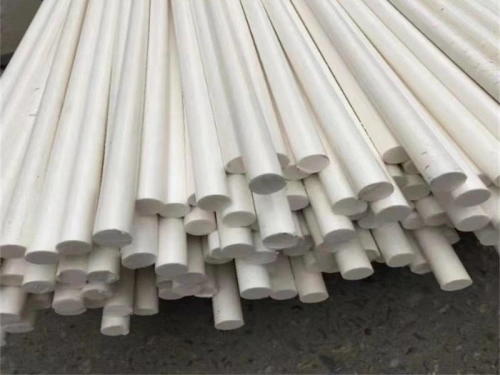
PE
PE, or Pre-Engineered tooling, is a method used in CNC machining to create predefined tool paths. This approach saves time by eliminating the need to program tool paths for each specific part, increasing efficiency in production. The advantage of PE for CNC machining is the reduction in setup time and the ability to quickly switch between different parts with minimal reprogramming. Additionally, PE can improve overall accuracy and consistency in machining processes. However, a disadvantage of PE is that it may not be suitable for complex or custom parts that require unique tool paths. In such cases, traditional programming methods may be more appropriate. Overall, PE for CNC machining offers significant time and cost savings for standard parts production.
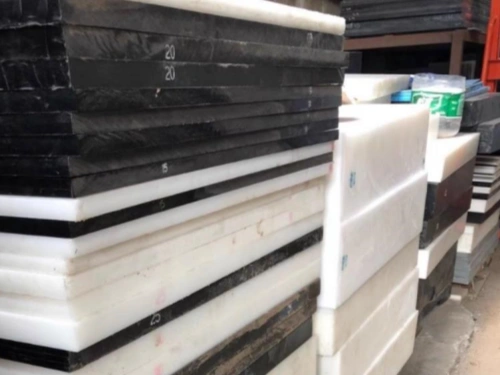
Nylon
Nylon is a common material used in CNC machining due to its versatility and wide range of applications. Its advantages include high strength and durability, making it ideal for producing parts that need to withstand wear and tear. Nylon is also known for being lightweight and flexible, allowing for more intricate designs to be created. However, nylon can be prone to warping during machining, leading to dimension inaccuracies in the final product. Additionally, it is not as heat-resistant as other materials such as metals, limiting its use in high-temperature environments. Overall, nylon is a popular choice for CNC machining when weight and flexibility are important factors, but it is essential to carefully consider its limitations before selecting it for a specific project.
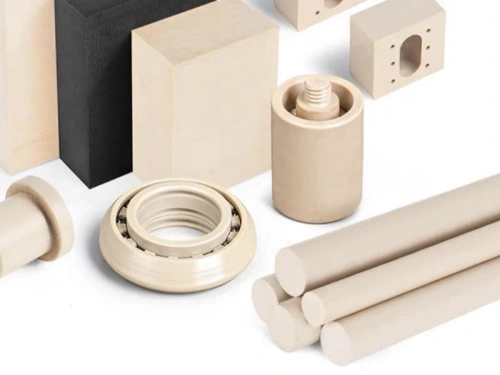
PEEK
PEEK, or Polyetheretherketone, is a high-performance thermoplastic material commonly used in CNC machining due to its excellent mechanical properties and resistance to chemicals and high temperatures. One of the main advantages of PEEK for CNC machining is its superior strength and stiffness, making it suitable for use in demanding applications where other plastics may fail. Additionally, PEEK is inherently resistant to wear and abrasion, extending the lifespan of machined parts. However, one major drawback of PEEK is its high cost compared to other thermoplastics, which can make it less accessible for some industries. Additionally, PEEK can be challenging to machine due to its high melting point and tendency to warp if not machined properly. Despite these drawbacks, PEEK remains a popular choice for CNC machining in industries where high performance and durability are essential.
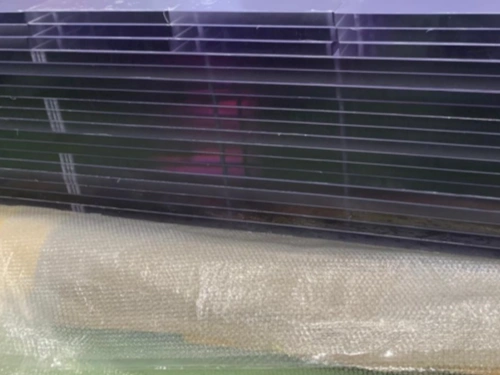
PC
PC for CNC machining, or Personal Computer Numerical Control, is a type of CNC system that utilizes a PC as the controller for a CNC machine. The main advantage of using a PC for CNC machining is its versatility and flexibility. PCs can easily interface with different software applications and programming languages, making it easier to program complex parts or prototypes. Additionally, PCs are generally more cost-effective and user-friendly compared to dedicated CNC controllers. However, a potential disadvantage of using a PC for CNC machining is the risk of system crashes or compatibility issues with software updates. This can lead to production delays and increased downtime. Overall, PC for CNC machining offers a wide range of advantages but users should be mindful of potential drawbacks and ensure proper maintenance and updates to prevent any disruptions in their operations.
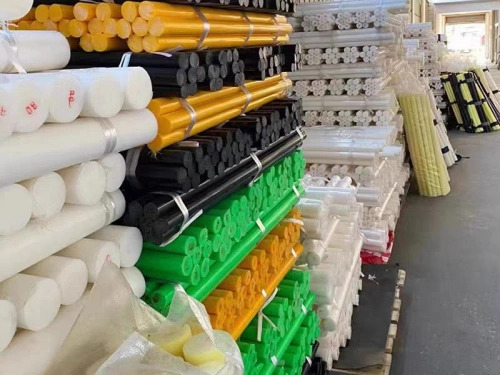
PP
PP, or polypropylene, is a commonly used material in CNC machining due to its versatility and cost-effectiveness. Its advantages include high chemical resistance, excellent electrical insulation properties, and good impact strength. PP is also lightweight and has a low moisture absorption rate, making it ideal for a wide range of applications. However, its disadvantages include poor UV resistance, low heat resistance, and limited mechanical strength compared to other materials such as metals. Additionally, PP can be difficult to bond or paint, which may limit design options for certain projects. Despite its limitations, PP remains a popular choice for CNC machining due to its overall performance and affordability.
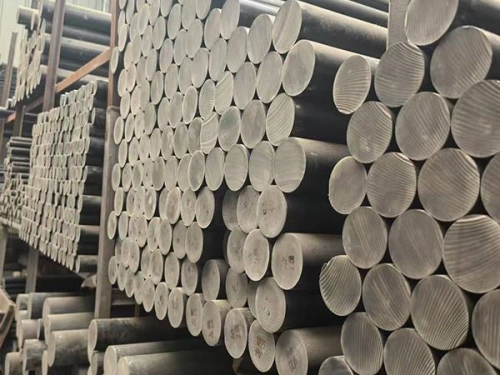
PET
PET (Polyethylene terephthalate) is a common material used for CNC machining due to its favorable properties such as good mechanical strength, stiffness, and chemical resistance. Its advantages include high dimensional stability, excellent surface finish, and ease of machining, making it a preferred choice for prototyping and producing small parts. However, PET can be prone to warping during machining due to its relatively low melting point and poor thermal conductivity. This can lead to challenges in achieving tight tolerances and intricate designs. Additionally, PET is not suitable for high-temperature applications, limiting its use in certain industries. Overall, PET offers a good balance of properties for CNC machining, but careful consideration of its limitations is necessary for successful manufacturing processes.
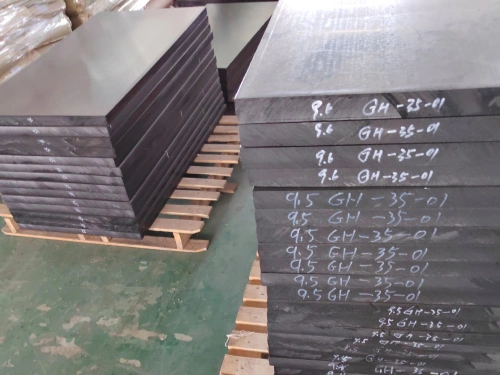
POM
POM, or Polyoxymethylene, is a type of engineering plastic commonly used in CNC machining due to its excellent mechanical properties and resistance to wear and tear. One of the main advantages of POM is its high strength and rigidity, making it ideal for producing precision parts with tight tolerances. Additionally, POM has low friction, allowing for smooth operation in moving parts. However, POM does have some disadvantages as well. It is sensitive to high temperatures, leading to potential deformation or warping during machining. POM also has poor resistance to certain chemicals, limiting its applications in environments with harsh solvents. Despite these drawbacks, POM remains a popular choice for CNC machining in various industries due to its overall performance and durability.
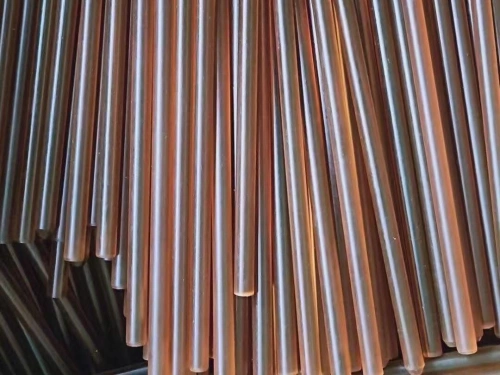
PVC
PVC, or polyvinyl chloride, is a widely used material in CNC machining due to its versatility and cost-effectiveness. One of the main advantages of PVC for CNC machining is its ease of workability – it can be cut, drilled, and shaped with relative ease, making it suitable for a wide range of applications. Additionally, PVC is lightweight, durable, and resistant to corrosion, making it ideal for both indoor and outdoor projects. However, one of the main disadvantages of PVC is its low heat resistance, which can limit its use in high-temperature environments. Furthermore, PVC can release toxic fumes when exposed to high temperatures, so proper ventilation is essential when machining this material. Despite these drawbacks, PVC remains a popular choice for CNC machining due to its affordability and versatility.
Surface Finishes
We bring expert knowledge and experience to every product surface we treat.
| Name | Description | Materials | Color | Texture | More |
|---|---|---|---|---|---|
| Brushing | Brushing is the act of cleaning the teeth and gums using a toothbrush and toothpaste. It helps remove plaque, prevent cavities, gum disease, and bad breath. It should be done at least twice a day for optimal oral health. |
Aluminum, Brass, Stainless Steel, Steel, ABS,etc | N/A | Satin | |
| Sand Blast | Sandblasting is a technique used to clean, shape, or smooth surfaces by forcibly propelling a stream of abrasive material against a surface under high pressure. This process is commonly used in industrial settings for a variety of applications. |
All Metal Materials, Plastic | N/A | Matte | |
| Tumbling | Tumbling is a form of gymnastics that involves performing a series of acrobatic and athletic movements such as flips, somersaults, and twists. It requires strength, flexibility, and precision to execute properly. |
All Materials | N/A | Smooth, Matte | |
| Polishing | Polishing is the process of refining a surface to improve its appearance or smoothness. It involves using abrasive materials to remove imperfections and create a smooth, shiny finish. Polishing is commonly used in the production of metal, wood, and glass products. |
All Materials | N/A | Smooth | |
| Anodizing | Anodizing is an electrochemical process that enhances the surface of metals like aluminum to improve corrosion resistance and durability. It involves creating a protective oxide layer through controlled oxidation. |
Aluminum, Titanium | Clear, Yellow, Green, Blue, Black, etc |
Smooth, matte finish. | |
| Painting | Painting is a form of art where colors, textures, and shapes are applied to a surface to create an aesthetically pleasing composition. It is a visual expression of an artist's emotions, ideas, and experiences. |
All Materials | Clear, Yellow, Green, Blue, Black, Multiple | Gloss, semi-gloss, flat, metallic, textured | |
| Black Oxide | Black oxide is a chemical conversion coating used to add corrosion resistance, reduce light reflection, and improve the appearance of ferrous materials such as steel or iron. It creates a deep black finish through a controlled oxidation process. |
Steel, Stainless Steel | Black | Smooth, matte | |
| Electroplating | Electroplating is a process in which a metal coating is applied to a conductive surface through electrolysis. This technique is commonly used to enhance the appearance, corrosion resistance, and durability of objects. |
Aluminum, Steel, Stainless Steel | Gold, Silver, Nickel, Copper, Brass, Zinc, Chrome | Smooth, glossy finish | |
| Powder Coating | Powder coating is a dry finishing process that involves applying finely ground particles of pigment and resin to a surface. The mixture is electrostatically charged and then sprayed onto the object, where it is heated and cured, creating a durable and uniform finish. |
Aluminum, Stainless Steel, Steel,etc | Custom | Gloss, matte or semi-gloss | |
| Alodine | Alodine, also known as chemical conversion coating, is a process used to protect aluminum and other metals from corrosion and enhance paint adhesion. It involves the application of a chemical solution that forms a protective layer on the metal surface. |
Aluminum, Stainess Steel | Clear, Gold | As machined | |
| Passivation | Passivation is a process used to protect metal surfaces from corrosion by forming a protective oxide layer. This layer acts as a barrier, preventing further deterioration and ensuring the longevity of the material. |
Stainess Steel | N/A | Matte | |
| Electroless Plating | Electroless plating, also known as auto-catalytic plating, is a process of depositing a thin layer of metal onto a substrate without the use of an external electrical power source. This method is widely used in industries such as automotive and electronics for its uniform coverage and corrosion resistance properties. |
Metal, Plastic | Gold, Silver, Nickel, Copper, Brass, Zinc, Chrome | Smooth, glossy finish |
Gallery Parts
CNC machining services Locations Near Connecticut, USA
Our workforce includes surface treatment specialists with years of proven success.
FAQ
Here, some of the most common questions about CNC machining services for Connecticut, USA. ” free to contact us if you have any question.”
Introduction
In Connecticut, USA, CNC machining services are in high demand for various industries. Whether you are looking for precision parts for aerospace, automotive, or medical applications, finding the right CNC machining service provider is crucial. To help you make an informed decision, we have compiled a list of frequently asked questions about CNC machining services in Connecticut.
Q: What are CNC machining services?
A: CNC machining services involve the use of computer-controlled machines to create precise and complex parts and components from a variety of materials.
Q: What industries can benefit from CNC machining services in Connecticut?
A: Industries such as aerospace, automotive, medical, and electronics can benefit from CNC machining services in Connecticut.
Q: How can I find a reliable CNC machining service provider in Connecticut?
A: You can start by researching online, asking for referrals from other businesses, and checking reviews and testimonials from previous customers.
Q: What materials can be used in CNC machining services?
A: CNC machining services can work with materials such as aluminum, stainless steel, brass, plastic, and more.
Q: What is the typical turnaround time for CNC machining services in Connecticut?
A: The turnaround time can vary depending on the complexity of the project, but most CNC machining service providers in Connecticut offer quick turnaround times to meet customers’ deadlines.
Q: How much do CNC machining services cost in Connecticut?
A: The cost of CNC machining services can vary based on factors such as material, complexity, and quantity. It is best to request a quote from the service provider for an accurate estimate.
Q: Can CNC machining services help with prototyping and small batch production?
A: Yes, many CNC machining service providers in Connecticut offer prototyping services and can handle small batch production to help businesses test and refine their designs.
Q: What is the difference between CNC milling and CNC turning?
A: CNC milling involves cutting and drilling operations, while CNC turning involves rotating a workpiece against a cutting tool to create cylindrical parts.
Q: Is CNC machining environmentally friendly?
A: CNC machining is considered more environmentally friendly compared to traditional machining methods, as it produces less waste and uses energy-efficient processes.
Q: Can CNC machining services in Connecticut provide customizations and modifications?
A: Yes, CNC machining services can provide customizations and modifications to meet specific design requirements and specifications for various industries.
Conclusion
Choosing the right CNC machining service provider in Connecticut is essential for the success of your project. By understanding the FAQs related to CNC machining services, you can make an informed decision and ensure that your parts are produced with precision and quality.
